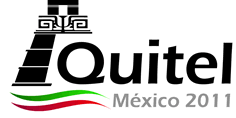









Important Dates
|
|
March 1, 2011
|
On-line registration begins
|
March 30, 2011
|
Call for abstracts
|
August 15, 2011
|
Early registration fee deadline
|
October 15, 2011
|
Abstract Submission Deadline
|
December 3, 2011
|
Two-day workshops begin
|
December 4, 2011
|
Inaugural Session
|
Contact
|
|
Quitel 2011
e-mail: quitel.2011@gmail.com
Dr. Gabriel Merino (Chair)
Departamento de Química
División de Ciencias Naturales y Exactas
Universidad de Guanajuato
e-mail: gabriel.merino2@gmail.com
Dr. Alberto Vela (Co-Chair)
Departamento de Química
Centro de Investigación y de Estudios Avanzados
e-mail: avela@cinvestav.mx
|
|

Riviera Maya, Mexico. 4-9 December 2011

Copyright. Quitel 2011. All Rights Reserved.
Workshops
Workshop ADF Quitel, Riviera Maya, December 3-4 2011
|
|
Tentative schedule
|
|
First day (Sat 3 Dec), morning session
|
|
9.00-9.30
|
Arrival / Installing ADF on laptops
|
9.30-10.00
|
Presentation I: the program package
• Overview ADF, BAND, QUILD, (ReaxFF)
• New features in ADF2010/2011
|
10.00-10.15
|
Demonstration ADF-GUI part I:
• Basics
|
10.15-11.00
|
Hands-on session I:
• Basics, standard GUI tutorials, easy exercises material
|
11.00-11.30
|
Coffee break
|
11.30-12.00
|
Presentation II: DFT
• Principles Density Functional Theory
• Accuracy of density functionals
|
12.00-12.15
|
Recent examples with ADF
|
12.15-14.00
|
Hands-on session II:
• Easy/medium exercises material
|
14.00-15.30
|
Lunch
|
First day (Sat 3 Dec), afternoon session
|
|
16.00-16.30
|
Presentation III: features ADF
• Fragment approach
• Relativistic corrections, basis sets (complete periodic table)
|
16.30-16.45
|
Demonstration ADF-GUI part II:
• New features in latest version
|
16.45-18.15
|
Hands-on session III:
• Own examples, medium/difficult exercises material
|
18.15-18.30
|
Questions&Answers
|
Second day (Sun 4 Dec), morning session
|
|
9.00-9.30
|
Presentation IV: calculation of properties
|
9.30-11.00
|
Hands-on session IV:
• Own examples, medium/difficult exercises material
|
11.00-11.30
|
Coffee break
|
11.30-12.00
|
Presentation V: models for chemical environment
• Multi-scale (QM/MM, QM/QM) schemes
(DRF, ReaxFF, DFTB, Mopac, UFF, ..)
• Frozen-density embedding
• Molecular dynamics, metadynamics
|
2.00-13.45
|
Hands-on session V:
• Chemical environment exercises material, own examples
|
13.45-14.00
|
Q&A, Closing
|
Note: Lectures in yellow; practical work in orange
Technical notes
For the practical work, participants will use their own laptops to run the calculations. Before coming to the short-course, attendants are kindly requested to download the demo version of the code from the CRYSTAL web site (both Linux and Windows versions are available). Installation of the demo version will be also possible during the 1st day during lunch time from CD-rom.
For Linux OS, participants must download also official scripts to run the code (link) and auxiliary programs to plot band structure, DOSs and charge density maps: Crgra2006.
For Windows, a simple GUI is available to run the code. Auxiliary programs are also provided with the GUI. A postscript viewer must be installed on your laptop. We suggest you to download and install ghostscript and ghostview (link).
Participants are kindly invited to download visualization tools which will be shown during the short-course:
- J-ICE. It is web-based (Java) graphical interface based on JMol. It is operating system independent. Java must be installed.
- Moldraw. It is a Windows program but it can also be run under Linux (see web site for details).
Tentative schedule
|
|
First day (Sat 3 Dec)
|
|
9.00-9.55
|
Translation symmetry, Space groups, Bloch functions, Fermi energy
|
9.55-10.50
|
Hamiltonians and Basis sets
|
Coffee Break
|
|
11.10-12.05
|
Total energy and energy derivatives. Geometry optimization of solids
|
12.05-12.55
|
The structure of CRYSTAL code
|
Lunch
|
|
14.30-16.15
|
Crystal Input/Output. Basis features (30 min). How to run the code & visualization tools (15 min). Single point energy calculations and related keywords (60 min).
|
Coffee Break
|
|
16.30-18.30
|
Single point energy calculations and related keywords-cont. (30 min). Geometry optimization (30 min).
|
Second day (Sun 4 Dec)
|
|
9.00-9.55
|
Lattice dynamics and related properties
|
9.55-10.50
|
One-electron properties. Spin polarized solutions. Spin densities and related properties.
|
Coffee Break
|
|
11.10-12.05
|
Vibrational frecuencies calculations.
|
12.05-12.55
|
One-electron properties: band structure, DOSs, charge density.
|
Lunch
|
|
Short-course on "Basic ab initio modelling of solids with CRYSTAL"
Lectures will be given on basic topic related to solid state chemistry (Translational symmetry in crystals, Bloch functions, Fermi energy) and ab-initio modeling (Hamiltonians and basis sets) followed by more specific lectures related to the CRYSTAL09 code and basic type of calculations. Practical work will be based on the CRYSTAL tutorials available at the CRYSTAL web site. In particular, guided exercises will be taken from the Introductory tutorials to CRYSTAL.
